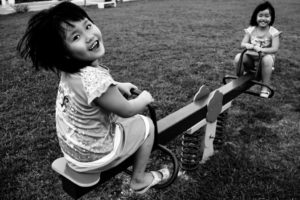Mind the Emotional Gap
 A high school senior contacted me a few weeks ago to ask my opinion on separating twins in primary school. She is a fraternal twin, and she and her sister live in the Northeastern United States. I will call her Nancy to protect her identity. At the beginning of our conversation, she asked me very broad, open-ended questions about separating twins. I clarified that it was unrealistic to address her concerns in such a generalized manner, as I certainly could not speak for all twins. I explained that the research I do is qualitative—based on listening to families’ experiences, concerns, and histories to help them decide what the best choice for their twins is in terms of school placement. I reiterated that each decision is best made on a case-by-case basis. Even qualitative research cannot give us definitive answers.
A high school senior contacted me a few weeks ago to ask my opinion on separating twins in primary school. She is a fraternal twin, and she and her sister live in the Northeastern United States. I will call her Nancy to protect her identity. At the beginning of our conversation, she asked me very broad, open-ended questions about separating twins. I clarified that it was unrealistic to address her concerns in such a generalized manner, as I certainly could not speak for all twins. I explained that the research I do is qualitative—based on listening to families’ experiences, concerns, and histories to help them decide what the best choice for their twins is in terms of school placement. I reiterated that each decision is best made on a case-by-case basis. Even qualitative research cannot give us definitive answers.
I asked Nancy to tell me about her primary-school experience. She explained that her parents had to separate the girls when they entered first grade because their local school district mandated separate classrooms for twins. Apparently, this outcome proved incredibly traumatic for both Nancy and her sister. She intimated that both of them experienced tremendous anxiety, which then manifested as maladaptive behavior. It sounded as if neither their parents nor the school personnel understood the depth of the twins’ discomfort and frustration.
Nancy is planning to become a teacher after she graduates. The research paper she is crafting will include a lesson plan for teachers who have twins in their classrooms—either together or separate. I told Nancy about the work of Dr. Eve-Marie Arce, an educator who wrote a terrific book about multiples and classroom settings titled Twins and Supertwins: A Handbook for Early Childhood Professionals. I put Nancy and Dr. Arce in contact with one another so that Nancy can discuss her research further with another terrific expert.
Nancy and her sister will attend different colleges in the fall. The girls have very different learning styles. Nancy is artistic and athletic, and her sister is very much an academic. The sister is the valedictorian of their graduating class and will attend an Ivy League college. Nancy shared that she had a tough time in middle school because she was constantly compared to her sister. However, her high school experiences have been very positive, and she is now able to feel incredible admiration and joy for her sister’s accomplishments.
After I hung up the phone, I began to think about the importance of making early school-placement choices based on emotional criteria rather than academic concerns. Emotional stability evolves along developmental lines. Hence, we can’t play catch-up as effectively with emotional issues as we can with academic gaps. Emotional concerns require more time and understanding and need to be made the top priority. Young children who do not feel emotionally safe in their classroom can have difficulty learning and performing academically. Parents and educators would be prudent to be patient with emotional growth, as it can be very different with and between twins.
Image courtesy of jiunn kang too (CC BY-SA 2.0)

